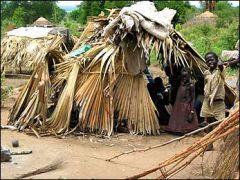Tribal violence in Darfur overshadows peace moves, hampers aid
GENEVA, June 2 (AFP) — Growing tribal conflict in Sudan’s strife torn region of Darfur is overshadowing peace efforts involving the Sudanese government and local rebels, a senior Red Cross official said Thursday.

|
|
These recent arrivals from the Nimule area of South Sudan are now living in shelters made of dried palm fronds in Palorinya. (UNHCR). |
Dominik Stillhart, the International Committee of the Red Cross (ICRC) chief in Sudan, said conflict between rebels, the government and its militia allies in Darfur was giving way to violence involving some 30 to 90 tribes there.
“This is bad news for conflict resolution. The peace process in Abuja under the auspices of the African Union will not be sufficient to bring peace to Darfur, what will also be required is tribal reconciliation,” Stillhart told journalists.
“There is clearly a reduced level of open hostilities, there is hardly any fighting any more between the two main parties, the government and its armed militias on one hand, and the Darfur rebels on the other.”
“This political conflict is being overshadowed more and more by a tribal conflict,” Stillhart added, warning that it was adding to the complexity of peace moves and hampering the aid effort in the western region.
Stillhart emphasised that the tribal violence, mainly over ever more scarce farm or grazing land in the increasingly more arid region, had little to do with any perceived tensions between ethnic Arabs or Africans.
Tribal leaders from Darfur as well as heads of the two main rebel groups in the region met under Libyan auspices in Tripoli last month and pledged to adhere to a ceasefire, help aid agencies and open migration routes.
Stillhart said insecurity that was stopping essential crops from being sown and harvested in Darfur was largely due to tribal conflict.
The ICRC, which is focusing on providing aid in rural areas, warned last week that food supplies for millions of people in the region were running critically low.
Less than a third of arable land was cultivated last year and the proportion is set to decline further, making Darfuris dependent on outside aid for at least another 18 months, the Geneva-based agency warned.
Economic problems were also amplified by the presence of many of the two million displaced people in camps around urban areas after they fled attacks on their villages over the past two years.
As many as 23 aid agencies were providing assistance in some camps without venturing further afield, Stillhart noted.
“That is another reason why people stay in these camps and do not go back to their villages, it does not really act as an incentive for people to go back,” he said.
A rebel uprising in early 2003 prompted the Khartoum government to unleash militias in a scorched-earth campaign in which tens of thousands died and about two million fled their homes, according to agencies.
